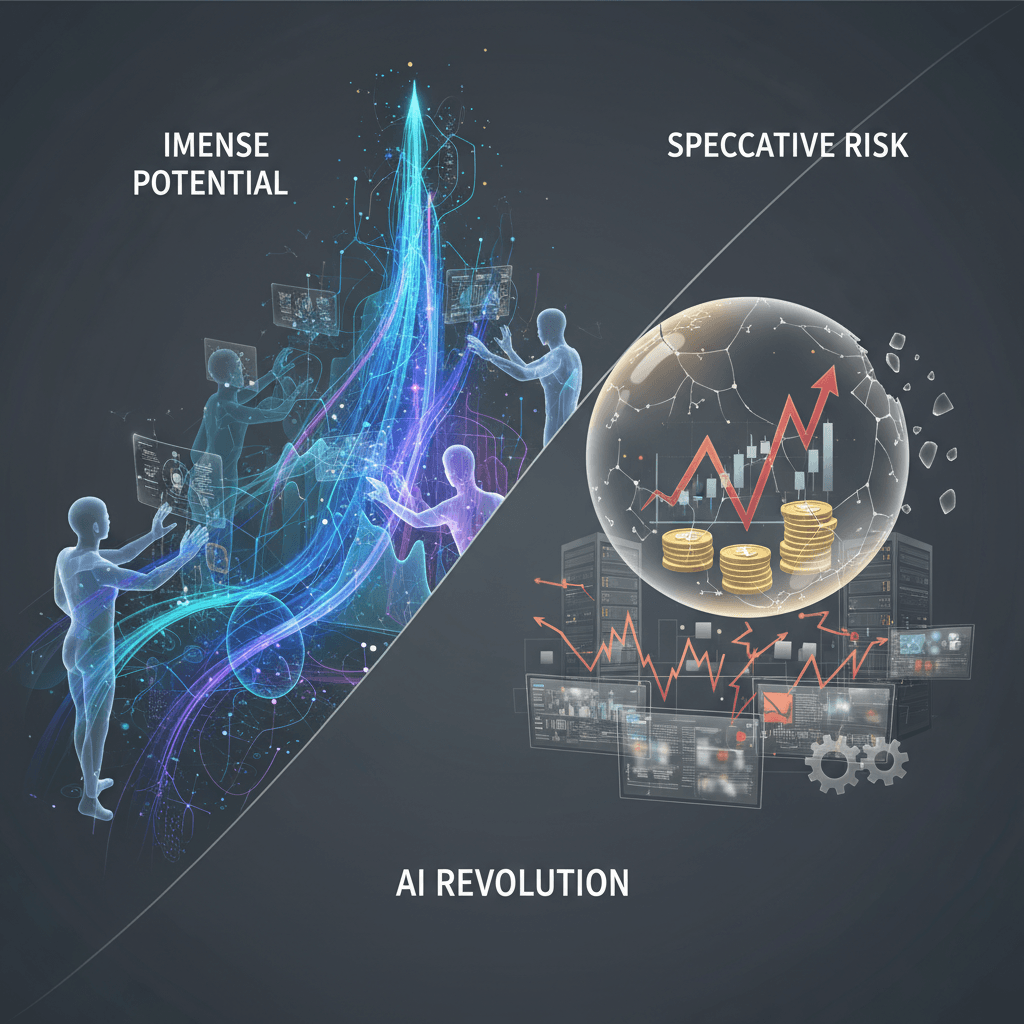Gates Hails AI Revolution, Warns Of Dot-Com Investment Bubble
Bill Gates calls AI his lifetime's biggest tech, but warns the current investment frenzy mirrors the dot-com bubble's costly failures.
October 30, 2025

Microsoft co-founder Bill Gates has characterized the current wave of artificial intelligence as "the biggest technical thing ever in my lifetime," a statement of profound significance from a figure who played a central role in the personal computing revolution.[1][2][3][4][5] While underscoring his belief in AI's transformative power, he has simultaneously issued a stark warning, comparing the frenzied investment climate surrounding the technology to the dot-com bubble of the late 1990s.[6][7][8][2][4] This dual perspective from one of the technology industry's most influential voices highlights a critical tension within the AI sector: the coexistence of genuine, world-altering potential with a level of speculative investment that is likely to produce a significant number of failures.[6][1] Gates' analysis suggests that while AI's long-term impact is not in doubt, the road to realizing that potential will be fraught with missteps and costly dead ends for many who have rushed into the field.[8][4]
Gates is careful to distinguish the current AI fervor from historical examples of pure speculative frenzy, such as the infamous "tulip mania" in 17th-century Holland.[6][8][4] His comparison to the dot-com era is more nuanced, recalling a period where a truly revolutionary technology—the internet—led to both spectacular successes and a vast number of overvalued companies that ultimately collapsed.[8][2][4] He argues that a similar dynamic is at play today, with a torrent of capital flowing into AI startups and infrastructure, from semiconductor chips to massive data centers.[7][1] According to Gates, many of these companies are "me-too" ventures, lacking a sustainable plan and burning through capital in a race to keep up.[6][8][4] He predicts that "absolutely, there are a ton of these investments that will be dead ends," a sobering assessment for an industry currently defined by multibillion-dollar valuations and a pervasive fear of missing out.[6][8][5] This perspective is shared by other industry leaders, including OpenAI CEO Sam Altman, who has also cautioned that investors may be "overexcited about AI."[6]
The scale of the financial commitments being made in the AI sector underscores Gates' concerns about a potential bubble. Companies are pouring immense sums of money into the foundational elements of AI, such as data centers, often without a clear path to profitability from these specific investments.[7][1] Gates points to the risk of companies committing to data centers with prohibitively expensive electricity costs or investing heavily in a generation of chips that quickly becomes obsolete.[1][3] This high-stakes environment creates immense pressure, as tech companies feel they have no choice but to participate in the AI race, lest they be left behind.[1][3] Interestingly, Gates' cautious stance is informed by his own experiences; Microsoft CEO Satya Nadella revealed that Gates was initially skeptical of the company's early $1 billion investment in OpenAI, a gamble that has since yielded an estimated 27 percent stake valued at around $135 billion.[6][8] This anecdote reveals both the potential for massive returns and the legitimate reasons for initial caution in such a volatile and unproven market.
Despite his warnings of a speculative bubble, Gates' fundamental belief in the long-term importance of artificial intelligence remains unshaken. He has described the development of AI as being as fundamental as the creation of the microprocessor, the personal computer, the internet, and the mobile phone, predicting it will change how people work, learn, and communicate.[9] He sees its economic value as "extremely high," comparing it to the net value created by the internet.[1][4][5] Gates envisions a future where AI acts as a "personal agent," enhancing productivity by handling tasks like drafting emails and managing schedules.[9] Beyond the corporate world, he is particularly focused on how AI can be deployed to reduce global inequities, accelerating medical research for diseases like AIDS and malaria, and providing essential services like medical advice and educational tutoring in underserved communities.[9][10][11] This optimistic outlook is tempered by a clear-eyed view of the risks, which he believes are manageable but require proactive governance.[12][13] He has pointed to the potential for AI-generated misinformation and deepfakes to undermine democracy, the increased risk of cyberattacks, and the significant disruption to the job market as key challenges that society must address.[12][13][14]
In conclusion, Bill Gates offers a complex and deeply informed perspective on the current state of artificial intelligence. His pronouncement of AI as the most significant technological development of his era is a powerful endorsement of its revolutionary potential.[1][4] However, this endorsement is coupled with a pragmatic warning that the path forward is not a straight line. The comparison to the dot-com bubble serves as a crucial reminder that even with a transformative technology, the market is prone to irrational exuberance and that many ventures will not survive the hype.[6][2][4] His message to the industry and investors is one of both excitement and caution, urging a focus on real, sustainable value over speculative frenzy. As the AI revolution continues to unfold, Gates' insights suggest that the ultimate winners will be those who can navigate the inevitable turbulence of the current boom while keeping a steady eye on the technology's profound and lasting impact on society.[8][2]
Sources
[1]
[2]
[4]
[5]
[9]
[10]
[11]
[12]
[13]
[14]